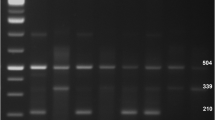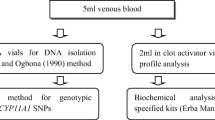Abstract
Background
Polycystic ovary syndrome (PCOS) is an endocrine disorder exhibiting variable age at onset of clinical features allied with complex diseases in the later life. ACE is a pleiotropic molecule associated with various pathophysiological functions. The present study was aimed to establish the frequency of ACE I/D gene polymorphism in patients and controls and to assess the influence of this polymorphism on anthropometric and various clinical features of the condition.
Methods
ACE I/D genotyping was carried out in 259 PCOS patients and 315 healthy ultrasound scanned women of South Indian origin.
Results
The distribution of DD, ID and II genotypes in patients was 39, 37 and 24 %, whereas in the controls it was 31, 51 and 18 % respectively. Significant difference was observed in the genotypic frequency distributions between the patients and controls, however the allelic frequencies did not vary between the groups (p > 0.05). Quartile analysis revealed preponderance of DD genotype in the first two quartiles and a linear increase of II genotype from first to the last quartiles. Further, Multiple Logistic regression analysis revealed significant association of ACE I/D gene polymorphism with acanthosis and age at onset (AAO) of the syndrome (p < 0.05).
Conclusion
The present study is the first report to highlight the predisposing role of DD and protective role of ID genotype towards PCOS. Patients with single or double dose of D allele may develop PCOS symptoms at an early age and also significantly associated with acanthosis, a marker of insulin resistance.



Similar content being viewed by others
Abbreviations
- PCOS:
-
Polycystic Ovary Syndrome
- ACE:
-
Angiotensin converting enzyme
- AAO:
-
Age at onset
- BMI:
-
Body mass index
- W/R:
-
Waist and Hip ratio
- OR:
-
Odds ratio
- RAS:
-
Renin Angiotensin System
- I/D:
-
insertion/deletion
References
Knochenhauer ES, Key TJ, Kahsar-Miller M, Waggoner W, Boots LR, Azziz R. Prevalence of polycystic ovary syndrome in unselected black and white women of south eastern United States: a prospective study. J Clin Endcrinol Metab. 1998;83(9):3078–82. doi:10.1210/jc.83.9.3078.
Farah L, Lazenby AJ, Boots LR, Azziz R. Prevalence of polycystic ovary syndrome in women seeking treatment from community electrologists. Alabama Professional Electrology Association Study Group. J Reprod Med. 1999;44:870–4.
Han S, Tan S, Elsenbruch S, Quadbeck B, Herrmarnn BL, Mann K, et al. Clinical and biochemical characterization of women with polycystic ovary syndrome in North Rhine-Westphalia. Horm Metab Res. 2005;37:438–44.
Balen AH, Dunger D. Pubertal maturation of the internal genitalia. Ultrasound Obstet Gynecol. 1995;6:164–5.
Elting MW, Korsen TJM, Rekers-Mombarg LTM, Schoemaker J. Women with polycystic ovary syndrome gain regular menstrual cycles when aging. Hum Reprod. 2000;15:24–8.
Ovalle F, Azziz R. Insulin resistance, polycystic ovary syndrome and type 2 diabetes mellitus. Fertil Steril. 2002;77(6):1095–105.
Legro RS. Polycystic ovary syndrome and cardiovascular disease: a premature association? Endocr Rev. 2003;24(3):302–12.
Hardiman P, Pillay OS, Atiomo W. Polycystic ovary syndrome and endometrial carcinoma. Lancet. 2003;361(9371):1810–2.
Wild S, Pierpont T, Jacobs H, McKeigue P. Long-term consequences of polycystic ovary syndrome: results of 31 year follow-up study. Hum Fertil (Camb). 2000;3(2):101–5. PMID: 11844363.
Deepika MLN, Ranjith K, Usha Rani V, Ishaq M, Jahan P. Familial background of complex diseases in PCOS probands of South Indian population. Asian J Epidemiol. 2012;5(2):50–5. doi:10.3923/aje.2012.50.55.
Giaccchetti G, Sechi LA, Rillis S. The rennin-angiotensin-aldosterone system, glucose metabolism and diabetes. Trends Endocrinol Metab. 2005;16(3):120–6.
Schwentner L, Wöckel A, Herr D, Wulff C. Is there a role of the local tissue RAS in the regulation of physiologic and pathophysiologic conditions in the reproductive tract? J Renin-Angiotensin-Aldosterone Syst. 2011;12(4):385–93. doi:10.1177/1470320311418140.
Yoshimura Y. The ovarian renin-angiotensin system in reproductive physiology. Front Neuroendocrinol. 1997;18:247–91.
Rigat B, Hubert C, Alence-Gelas F. An insetion/deletion polymorphism in the angiotensin I converting enzyme gene accounting for half the variance of serum enzyme levels. J Clin Invest. 1990;86:1343–6.
Jia H, Wang B, Yu L, Jiang Z. Association of angiotensin-converting enzyme gene insertion/deletion polymorphism with polycystic ovary syndrome: a meta-analysis. J Renin Angiotensin Aldosterone Syst. 2012;0(0):1–8. doi:10.1177/1470320312452768.
Celika O, Yesiladab E, Hascalika S, Celikc N, Sahind I, Keskind L, Ozerole E. Angiotensin-converting enzyme gene polymorphism and risk of insulin resistance in PCOS. Reprod Biomed Online. 2010;20(4):492–8. PMID: 20138007.
Sun J, Fan H, Che Y, Cao Y, Wu X, Sun H, Liang F, Yi L, Wang Y. Association between ACE gene I/D polymorphisms and hyperandrogenism in women with Polycystic Ovary Syndrome (PCOS) and controls. BMC Med Genet. 2009;10:64. doi:10.1186/1471-2350-10-64.
Karabulut A, Turgut S, Turgut G. Angiotensin converting enzyme gene insertion/deletion polymorphism in patients with polycystic ovary syndrome. Gynecol Endocrinol. 2010;26(6):393–8.
Tippisetty S, Ishaq M, Komaravalli PL, Jahan P. Angiotensin converting enzyme (ACE) gene polymorphism in vitiligo: protective and predisposing effects of genotypes in disease susceptibility and progression. Eur J Dermatol. 2011;21(2):173–7.
Bayram B, et al. Association of angiotensin converting enzyme (ACE) gene I/D polymorphism and polycystic ovary syndrome (PCOS). Gene. 2011;489(2):86–8.
Van Sande ME, Scharpe SL, Neels HM, Van Camp KO. Distribution of Angiotensin converting enzyme in human tissues. Clin Chim Acta. 1985;147(3):255–60.
Plendl J, Neumiiller C, Vollmar A, Auerbach R, Sinowatz F. Isolation and characterization of endothelial cells from different organs of fetal pigs. Anat Embryol. 1996;194:445–56.
Acosta TJ, Berisha B, Ozawa T, Sato K, Schams D, Miyamoto A. Evidence for a local endothelin-angiotensin-atrial natriuretic peptide systemin bovine mature follicles in vitro: effects on steroid hormones and prostaglandin secretion. Biol Reprod. 1999;61(6):1419–25.
Nielsen AH, Hagemann A, Svenstrup B, Nielsen J, Poulsen K. Angiotensin II receptor density in bovine ovarian follicles relates to tissue renin and follicular size. Clin Exp Pharmacol Physiol. 1994;21(6):463–9.
Koh WP, Yuan JM, Sun CL, et al. Angiotensin I-converting enzyme (ACE) gene polymorphism and breast cancer risk among Chinese women in Singapore. Cancer Res. 2003;63:573–8.
Koika V, Georgopoulos NA, Piouka A, Roupas ND, Karela A, Armeni AK, Katsantoni E, Panidis D. Increased frequency of the DI genotype of the angiotensin-I converting enzyme and association of the II genotype with insulin resistance in polycystic ovary syndrome. Eur J Endocrinol. 2012;166(4):695–702. PMID: 22223701.
Javaid A, Mansoor Q, Bilal N, Bilal A, Shaukat U, Ismail M. ACE gene DD genotype association with obesity in Pakistani population. Int J Bioautom. 2011;15(1):49–56.
Cao Y, Wang Y, Zhou P et al. Relationship between ACE gene polymorphism and the renin-angiotensin system in PCOS patients. Chinese Journal of Practical Gynecology and Obstetrics; 2002–11. doi:CNKI:SUN:ZGSF.0.2002-11-012.
Acknowledgments
We thank all the subjects for their co-operation in giving consent for blood sample and the clinical information. And we would also like to thank all the doctors and nursing staff of various Endocrinological Clinics of Hyderabad, (India) for supporting the implementation of the study and assisting with data collection. We further thank Indian Council of Medical Research (ICMR), India for providing financial assistance to M.L.N Deepika.
Disclosure statement
The authors declare that no competing financial interests exist.
Author’s contribution
Deepika M.L.N performed the experiment and drafted the manuscript; K. Ranjith worked on initial analysis of data generated, Dr. Usha Rani helped in sampling, Dr. N Balakrishna carried out the statistical analysis, Dr. Parveen Jahan and K. Prasanna Latha contributed to the preparation of manuscript.
Author information
Authors and Affiliations
Corresponding author
Additional information
Capsule
The ACE ID genotype confer protection to PCOS in our population. The D allele either in single or double dose appears to influence the age at onset of the disease.
Rights and permissions
About this article
Cite this article
Deepika, M.L.N., Reddy, K.R., Rani, V.U. et al. Do ACE I/D gene polymorphism serve as a predictive marker for age at onset in PCOS?. J Assist Reprod Genet 30, 125–130 (2013). https://doi.org/10.1007/s10815-012-9906-8
Received:
Accepted:
Published:
Issue Date:
DOI: https://doi.org/10.1007/s10815-012-9906-8




